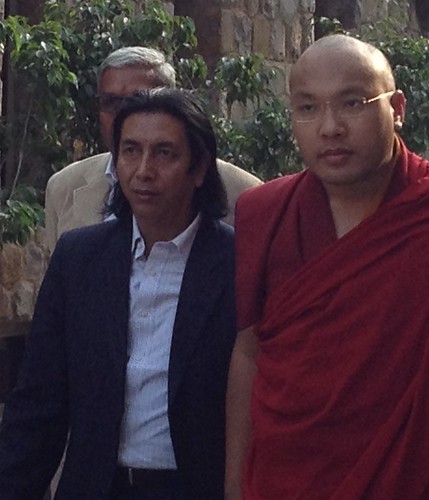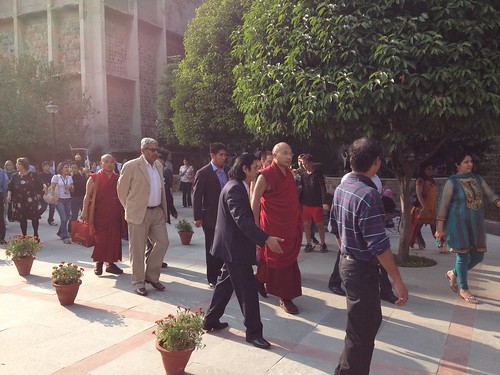The most important Tibetan spiritual leader, after the Dalai Lama, visited our school today as part of our Peace and Global Citizens initiatives. His Holiness the 17th Gyalwang Karmapa arrived with little pomp and sat in the theatre, answering questions from students. Born into a family of nomads in Tibet, Ogyen Trinley Dorje was recognized as the 17th Karmapa as a young child. In 1999, at the age of 14, he left Tibet to meet the exiled Dalai Lama and other teachers in India.
According to the website kagyu.org,
In the case of an enlightened being, rebirths are taken consciously, motivated by a desire to benefit all living beings and made possible by the depth and clarity of an individual’s realization. The first such reincarnation (tulku) was recognized in thirteenth-century Tibet. His name was the Gyalwa Karmapa, “The Victorious One of Enlightened Activity.” Thereafter, he continued to return, generation after generation, until the present seventeenth Karmapa. The Karmapa is said to embody the activity of all the buddhas of the past, present, and future. Citing ancient texts, traditional histories trace his lives back for eons and continue it forward into the distant future.
The Karmapa held several Q&A sessions with students from all grade levels; I attended his session with some middle school kids. The Karmapa leaned forward in his chair to address the students, carefully mulling over each question.
One student asked, “What is the most important value of the Tibetan culture?” The Karmapa responded in a low voice, interspersed with English words, and shared with the audience by a translator, Sister Damcho, an American who lives in a Dharamsala nunnery and frequently works with the Karmapa. “The life that we live is a pretty simple life,” she quoted. “We put at the center of our life altruism, the wish to benefit others. We’re pretty direct and straightforward. I think if you look at Tibetan culture, the most important values at the center of our culture are loving kindness and compassion, and we develop these feelings not just for other human beings but for all forms of life. Whatever we do, whatever activities we engage in, whatever studies we do, we always try to put the value of other beings in the center.”
He was open about neither choosing nor necessarily having fun in his role as Karmapa. In response to the question, “How did you decide to be a Karmapa?” he shook his head and laughed. “Decide?”
Sister Damcho translated: “So actually, I did not decide to be a Karmapa. In the west, people have a lot of choice and generally you decide what you want to study and when you finish your studies, you decide what job or career you want to have, but that was not the case with me. When I was 8 years old, I was just a normal boy. I played with other kids. I had a normal boy’s life. Then some people came and they told me, ‘You’re the Karmapa.’ At that time, I didn’t even understand what the Karmapa was … I thought, if I’m the Karmapa, I’ll probably get a lot of toys. I found out later being a Karmapa is not all that fun. It’s a lot of work and a lot of responsibility and a lot of studying. So becoming the Karmapa was not something I decided. It was more like something that just fell from the sky.”
My favorite bit of advice was the Karmapa’s response to the question, “What can we do to maintain peace?”
“We have so many different things that we’re constantly doing, and there are all these changes going on all the time, so it’s really not that easy, is it? I would say, to put it simply, just relax. Just relax and stay quiet. Generally speaking, this is a difficult question. For you, as kids, to be able to make peace, maybe don’t make it too complicated. Make it simple. Just relax.”
Arriving at AES, the Karmapa gets mobbed by the paparazzi (aka our director, principals and other interested onlookers).

Getting escorted to the theatre.

I feel privileged and grateful today for my school and its commitment to fostering peace. What an honor to share a bit of time with this humble man.


